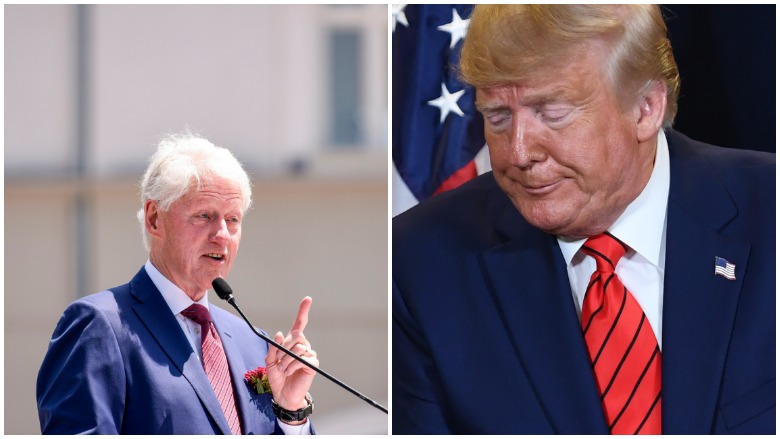
Getty
Only two presidents — Andrew Johnson and Bill Clinton — have been impeached by the House of Representatives in U.S. history. Neither was removed from office. A third president, Richard Nixon, resigned amid an impeachment inquiry in 1974. He is the only president to have resigned.
Many people wrongly think Nixon was impeached. He was not impeached, as The Washington Post clarifies: rather, the House Judiciary Committee approved articles of impeachment for Nixon in 1974, but Nixon resigned prior to a House vote on those impeachment charges.
House Speaker Nancy Pelosi announced that she would be calling for a formal impeachment inquiry against Donald Trump by the House of Representatives on Sept. 24.
However, that doesn’t mean that impeachment proceedings against the president will happen any time in the next few weeks, and it doesn’t guarantee an impeachment charge. That will require a majority vote of 218 or more in the House of Representatives.
Here’s what you need to know:
Andrew Johnson: Impeached, Then Acquitted in 1868
Andrew Johnson was the first president to ever be charged with impeachment. Specifically, he was charged with 11 articles of impeachment, most revolving around an alleged violation of the Tenure of Office Act. The trial took place in March, 1868; in May, a majority of senators voted to convict Johnson, but there wasn’t enough of a majority (aka 2/3 majority) to convict him.
Bill Clinton: Impeached in 1998, Then Acquitted in 1999
On Dec. 19, 1998, the House of Representatives approved two articles of impeachment against Bill Clinton, the president at the time, after 14 hours of deliberation. Per a History Channel account, Clinton was charged with lying under oath to a federal grand jury, and obstructing justice, both in connection to his alleged inappropriate romantic relationship with an intern named Monica Lewinsky.
The impeachment proceedings themselves would take place almost a month later in Jan. 1999. The Chief Justice of the Supreme Court at the time, William Rehnquist, was the judge, and senators served as jurors.
Then, on Feb. 12, 1999, the Senate voted to acquit Clinton. Specifically, 45 Democrats and 10 Republications voted “Not Guilty” on the charge of perjury, and there was a 50-50 vote for the charge of obstruction of justice. Neither of the votes was even close to the 2/3 majority necessary to push the president out of the office.
Richard Nixon: Resigned in 1974 Under Threat of Impeachment
Though Richard Nixon is often the president that comes to mind when people wonder about what presidents have been impeached, he actually didn’t undergo impeachment proceedings. He resigned prior to a House vote on impeachment charges. Therefore, he didn’t have to move through the process at all.
Nixon resigned on August 8, 1974. Per an archived article of The Washington Post, Nixon did not admit to any of the “high crimes and misdemeanors” he was charged with; rather, he said that he had to “put the interests of America first,” and said he’d realized he no longer had “a strong enough political base in the Congress” for him to be an effective president.
The closest he came to acknowledging the charges against him was when he said, “I deeply regret any injuries that may have been done in the course of the events that led to this decision.”
WATCH: Nancy Pelosi Calls for Impeachment Inquiry of Donald Trump
Above, you can see the official announcement Pelosi made on Tuesday evening, in which she declared the intent to have a formal impeachment inquiry against the president.
Earlier that day, Rep. John Lewis called for impeachment proceedings to be brought against Trump. He said in part, “The future of our democracy is at stake. I truly believe the time to begin impeachment proceedings against this president has come. To do otherwise would betray the foundations of our democracy.”
READ NEXT: How Long Does Impeachment Take? When Do Proceedings Begin?